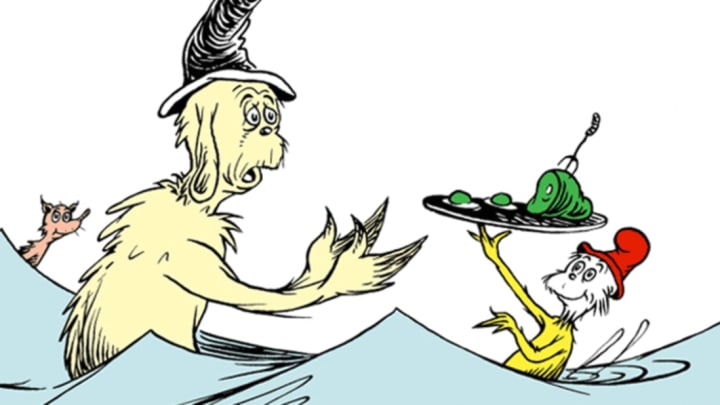They do not like Green Eggs and Ham.
1. Green Eggs and Ham
In 1965, the government of The People's Republic of China decided they like Green Eggs and Ham about as much as mystery-creature Sam does at the start of the book—which is to say, not at all. It was banned until Theodor Seuss Geisl died in 1991 on account of the "portrayal of early Marxism."
2. Alice in Wonderland
Wikimedia Commons
Lewis Carroll's famous tale of imaginative nonsense came under criticism in America for its assumed portrayal of drug use and possible subtle satire of politics and religion. But even before that, the book had been banned in the Hunan Province in China on the grounds that “animals should not use human language, and that it was disastrous to put animals and human beings on the same level.”
3. The Big Bang Theory
CBS
Over the last generation, American TV shows have found a receptive audience in China. But just recently, the government abruptly banned The Good Wife, NCIS, The Practice, and the popular hit on both sides of the Pacific, The Big Bang Theory. When Chinese fans demanded an explanation, the censorship agency offered only that they were either out of copyright or contained “content that violates China’s constitution, endangers the country’s sovereignty and territorial integrity, provokes troubles in society, promotes illegal religion and triggers ethnic hatred.”
4. Gambling
iStock
Except for two state-run lotteries, gambling is illegal in all of mainland China. This has led to a Las Vegas-like casino scene in Macao but the mainland laws are so stringent, even advertising for the nearby legal gambling is forbidden in China.
5. Gaming Consoles
iStock
This ban was recently lifted, but only after 14 years without Xbox or Wii or PlayStation in the People's Republic. The government cited the violent content of many games for the ban and certain titles will still be illegal.
6. Online Dating for Army Personnel
iStock
In 2010, the Communist Party’s Central Military Affairs Commission issued a series of internet restrictions for members of the armed services. “Seeking marriage partners, jobs or making friends through the public media is not permitted. Going online in local Internet cafes is not permitted,” the regulation states. “Opening websites, home pages, blogs and message forums on the Internet is not permitted.” The ban was imposed to prevent personnel from leaking military secrets during their online chats.
7. Remembering the Tianamen Square Massacre
Getty Images
Not only is the incident banned from mention in textbooks and Chinese-controlled websites, over 100 terms are blocked from internet search results around the June 4th anniversary. This year, all of Google search was inactive leading up to the 25th anniversary.
8. Jasmine Flowers
iStock
Afraid that the so-called "Jasmine Revolution" in Tunisia would inspire similar insurgence in China, the Chinese Communist Party cracked down on the dainty white flower in 2011. The word was blocked in text messages, video of the president singing a song about jasmine was wiped from the internet, and a vague ban was placed on selling the flower at markets.
9. Brad Pitt, Richard Gere, and Many Other Celebrities
Getty Images
The Chinese government has proved to have an extremely low tolerance when it comes to supporters of the Tibetan Independence Movement. Actors Harrison Ford and Richard Gere, a devout Buddhist, have been banned from entering the country after publicly expressing their support for Tibet. Martin Scorsese was banned in response to his 1997 film Kundun, which chronicles the life and exile of Tenzin Gyatso, the 14th Dalai Lama. And Brad Pitt is forbidden from entering the country simply for starring in Seven Years in Tibet.
10. Avatar (in 2D)
20th Century Fox
After enjoying two weeks in 2010 as a hit in China, Avatar 2D was banned. Authorities claimed the move was an economic one, favoring the 3D version, but critics of the decision pointed out that with only 550 such screens nationwide the ban essentially kept the film out of the public sphere. Additionally, China's Central Publicity Department issued an order to the media "prohibiting it from hyping up Avatar." Taken together, the effective ban was seen as an attempt to give domestic films an edge at the box office and censor the content, which could be seen as an allegory for China's policy of forced evictions.
